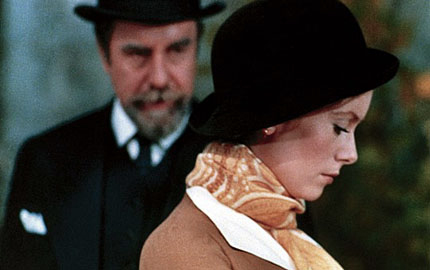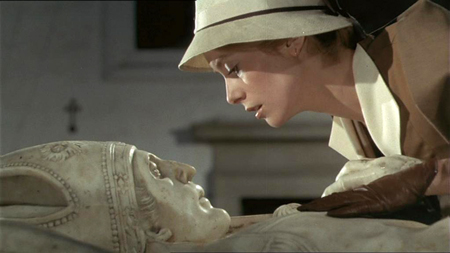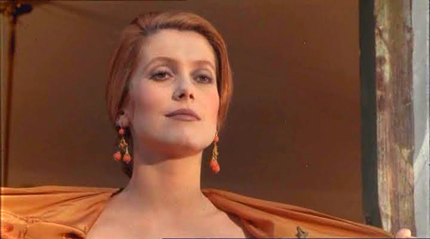
 |
|
|
|
Casual art filmgoers consider the great Luis Buñuel as a maker of wicked black comedies, a satirist imp who deflates rich capitalists, social complacency and the Catholic Church. They forget that his filmography also includes some stunning literary adaptations, such as Robinson Crusoe, and Diary of a Chambermaid. Buñuel's The Milky Way, a fantasy romp through historical heresies, is probably the most thoughtful and astute film ever about the Church of Rome, and could only be made by someone deeply invested in the traditions of faith. When Buñuel criticizes the world, he doesn't exclude himself from the list of targets. Although the Franco regime forced him to make most of his movies in other countries, he's still the most Spanish of great filmmakers. 
Franco's victory drove many Spanish artists into exile. Luis Buñuel was welcomed at New York's Museum of Modern Art as an expert in European cinema, and was beginning to find Hollywood work. Then his former collaborator Salvador Dalí, out of foolishness or malice, denounced Buñuel as a Communist, ending his employability in the United States. The filmmaker began his feature directing career in Mexico, where he remained until 1960. With Los Olvidados and Subir al cielo Buñuel entered the top rank of international filmmaking. This prestige led to his return to Spain to film once again. The shocking Viridiana contained scenes of sexual perversion and blasphemy that saw Buñuel once again banished from filmmaking in his homeland. But Buñuel had themes to express that required the Spanish background. His next chance to film in Spain came nine years later, with 1970's Tristana, his third film based on a novel by Spain's Benito Pérez Galdós. Buñuel's co-screenwriter Julio Alejandro had worked with him as far back as 1954's Cumbres Borrascosas, an adaptation of Wuthering Heights. If anything, the collaborators downplayed the sensational aspects of Tristana, allowing its essential perversity to come through on its own. When her devout, poor mother passes away, young Tristana (Catherine Deneuve) is adopted by her uncle Don Lope (Fernando Rey), a man who lives on a modest income but affects the pose of an aristocrat among his friends. Don Lope is a vocal adherent to 'traditional principles'. He refuses to officiate in a duel when he discovers that it won't be to the death. He maintains that the very idea of working is abhorrent, although he continually asks his sister for money. She considers him a shameless sinner because he shuns the church and seduces women. Don Lope 'generously' allows Tristana to bring her mother's crucifix into his house, but says that he'll cure her of useless superstitions. He tells his drinking buddies that any woman is fair game for seduction except the wife of a friend or a certain class of innocent. But Don Lope soon has his way with Tristana. As master of the house he discourages her going outside, and certainly not alone. Tristana's only companions are the housekeeper Saturna (Lola Gaos) and her deaf mute son Saturno (Jesús Fernández). She is kind to the boy even when he shows signs of an infantile sexual attraction to her. As if she had no choice, Tristana becomes Don Lope's lover, at his convenience. He considers her both his niece and his unofficial wife. Stifled by the petty tyranny of this relationship, Tristana sees hope only when she meets Horacio, an artist (Franco Nero). Horacio is willing to take her away, but Tristana and Saturna can't keep Don Lope from finding out. He's determined to hold on to his amorous possession. Tristana has no conventionally shocking content, but Buñuel uses the Galdós story as a framework to critique the bourgeois social cruelty that he remembered from his youth. As critic Raymond Durgnat has pointed out, Buñuel moved the time period up to the late 1920s, but also shifted the setting from Madrid to Toledo, a less modern city. Like a cock of the walk, Don Lope wears a cape and carries a cane as he strolls the narrow cobbled streets, perhaps to proposition a passing girl. He waxes his mustache and dyes his beard to look younger, and tells himself that women prefer older men, real men. In this ancient city women like Tristana are never supposed to wander alone, so she becomes a social outlaw as soon as she speaks to the unorthodox Horacio. 
What makes Tristana fascinating is that it is not about the seduction of an innocent. Tristana and Saturna are aware of what is going on at all times, and that they are powerless to do anything about it. We even wonder if Saturna's boy Saturno might actually be Don Lope's son. Don Lope does not seem so generous as to allow a troublesome 'defective' to live under his roof without good reason. Tristana is surprised by Don Lope's advances, but not repelled. She simply accepts them. But her sexual fantasies erupt in her dreams. They depict the first sign of rebellion. Climbing a bell tower with Saturno and his lewd friend, she allows them to pull at her skirt and legs. And then the church bell's clapper turns out to be Don Lope's severed head... Buñuel is at no loss for striking imagery. Visiting a cathedral, Tristana draws her face near a carved stone saint on the lid of a massive tomb. The father figure is imposing but dead, a clear symbol for the patriarchal system that reduces women to chattel. Yet Tristana seems willing to play her part in the inequitable charade, and keep her rage hidden inside. The latter stages of the story are where the surprises come into play. Although nothing goes wrong with the Tristana/Horacio relationship, a tragedy brings Tristana back to Don Lope's house. He's older and less aggressive, and cannot believe his luck. Part of Tristana's decision has to do with the fact that Don Lope has inherited his sister's fortune; he buys a house in the country. But the relationship has changed 180°. Tristana marries her uncle in the church, 'sanctifying' their perverse relationship. But she refuses to bed Don Lope and dominates the household. As he grows more passive, Don Lope accepts priests into his house. The outwardly cold Tristana now indulges sex games of her own. Saturno waits in the garden for her to expose herself on the balcony. The smile on Tristana's face is almost demonic; there had been nothing like it since Sybille Schmidt's mysteriously evil half-grimace back in Carl Theodor Dreyer's early horror classic Vampyr. Tristana has waited a long time to work her petty vengeance on Don Lope, and she relishes every moment of it. In Tristana the 'mature' Luis Buñuel has fashioned a masterpiece that is arguably more subversive than his avant-garde surrealist shock movies from his anarchic early years. Tristana and Don Lope's story doesn't exaggerate the social and sexual cruelties of the traditional status quo of Spanish life, where power in the bedroom is the foundation of the political power that refuses to progress into the 20th century. Fernando Rey stands in for the hypocritical ruling class that speaks for all but really represents only its own privileges. The voiceless Saturno might as well be the working class, locked into a future of eternal servitude. 
Fernando Rey had played Viridiana's defiler, and Buñuel would continue to use him to represent socially accepted knaves. Rey proved an excellent villain in William Friedkin's The French Connection and also excelled as the cuckolded victim of feminine wiles in Buñuel's That Obscure Object of Desire. Franco Nero plays Horacio as a liberated fellow who makes no extraordinary demands on Tristana. We don't see any of their life together but we get enough clues to surmise that Horacio can't hold Tristana precisely because he treats her so well. Domestic harmony has had no place in her life and, whether she knows it or not, she is still committed to a power struggle with her domineering uncle/husband. As for Catherine Deneuve, Luis Buñuel was perhaps the first filmmaker to exploit her icy, remote beauty in an interesting way. Deneuve's Belle de Jour is an almost absolute mystery whose true emotions and inner secrets remain hidden. But in Tristana Buñuel exploits this same cold, unreadable quality to portray a powerless woman who goes from inexperience to disillusion. When she sees the opportunity to seize control, Tristana expresses her hatred in petty acts of cruelty. Her sex game with Saturno, therefore, gives her pleasure only because she knows how much it would humiliate her despised husband. The Cohen Film Collection's Blu-ray of Tristana is a stunning HD transfer of a film previously seen only in weak and degraded video copies. José F. Aguayo's cinematography of Toledo's steep, cobblestoned streets evokes a long-lost vision of Spain; Buñuel purposely opts not to show any of the city's tourist attractions. He does show scenes of mounted Spanish policemen with sabers, attacking protesting students on the street. Although no details are given, the conflict acknowledges the political turmoil of Buñuel's youth -- in a few years there would be civil war. The disc carries a number of scholarly extras. Catherine Deneuve and Kent Jones are present on a new (2012) audio commentary. Buñuel biographer Peter William Evans hosts a lengthy video essay on the director and his film. An alternate ending is offered, although we cannot immediately tell why it would have been created. A reissue trailer rounds out the video extras. An insert booklet contains Ms. Deneuve's diary entries during filming, a new essay by Richard Porton and a reprint of critic Raymond Durgnat's chapter on Tristana from his insightful book on Buñuel. The main feature has been given two audio tracks, the original Spanish and an export English dubbed track. The English subtitles are clear, but they do not bother to translate many idiomatic expressions found in the film's dialogue.
On a scale of Excellent, Good, Fair, and Poor,
Tristana Blu-ray rates:
Reviews on the Savant main site have additional credits information and are often updated and annotated with footnotes, reader input and graphics.
Review Staff | About DVD Talk | Newsletter Subscribe | Join DVD Talk Forum |
| ||||||||||||||||||